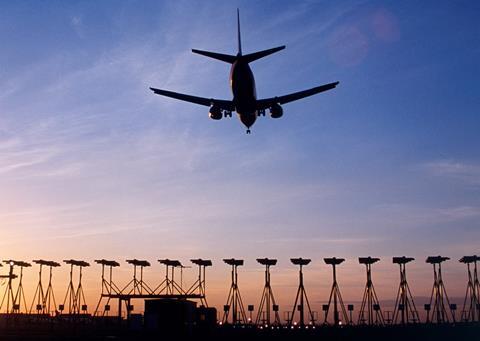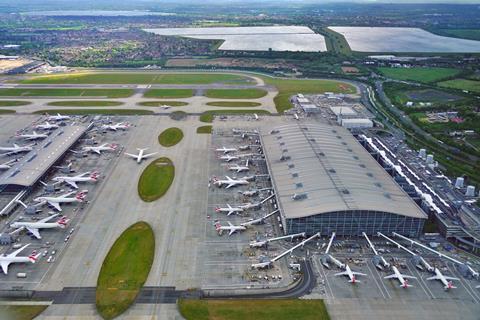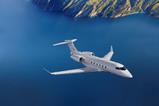The UK risks losing its position as a leader in the development of sustainable aviation technologies unless the government takes urgent action to support the industry, notably to incentivise production of green fuels, a pressure group has warned.
Launching its updated Net-Zero Carbon Road Map today, Sustainable Aviation – whose members include airframers, propulsion specialists, fuel providers and airport operators – highlights the progress the sector has made since the launch of the document in 2020.
This, it says, confirms “that UK aviation can continue to grow whilst meeting its commitment to net-zero carbon emissions by 2050”.

Development of new technologies – such as hydrogen-based propulsion systems – and the emergence of a nascent sustainable aviation fuel (SAF) industry have “made the UK a global leader in sustainable aviation technology, creating an opportunity to establish Britain as the home of a low-carbon aviation industry – creating thousands of jobs and attracting billions in inward investment,” it says.
“The UK has the right conditions to lead the world in developing sustainable aviation technologies like SAF and zero-carbon emission hydrogen-powered aircraft,” says the report.
However, Sustainable Aviation warns that “this leadership and the opportunity to make the UK home to a low-carbon aviation industry is at risk.
“Without urgent Government action the UK may miss out on these industries of tomorrow.”
Noting the “global race” to capture private investment in zero-carbon technologies and “create the jobs of the future”, Sustainable Aviation points to the widespread initiatives enacted by the USA and Europe to help the sector.
“The US has passed the Inflation Reduction Act, which includes hundreds of billions of dollars in incentives for low-carbon technologies, including SAF and hydrogen production, and the EU is distributing billions of euros in carbon allowances to help subsidise the higher cost of SAF for its airlines,” it says.
“The US and Europe are surging forwards in the race to create new industries in sustainable aviation fuels and technology. The UK has all the natural advantages to be able to join them - but we need to move quickly,” adds Matt Gorman, the organisation’s chair.
Sustainable Aviation identifies increased SAF use as a central pillar of the drive to achieve net-zero flying in the coming decades. It forecasts that this measure alone will enable the UK aviation industry cut 26.4 million tonnes of carbon dioxide emissions by 2050 – on its own almost 40% of the predicted 67.4 million tonne reduction required, the report says.

Fuel-burn savings achieved through better air traffic management and the introduction of more efficient or zero-emission aircraft will help cut a further 22.6 million tonnes of CO2, it adds.
To date, just one SAF production plant is operational in the UK – a Phillips 66 site in the east of England – although eight more producers have plans for facilities in the country “with the right government incentive policies”.
In order to secure the UK’s future SAF needs, the government must commit to “delivering commercial UK [SAF] production at scale this decade,” says Sustainable Aviation. That includes making good on a previous pledge of “seeing five UK SAF plants under construction by 2025, by providing an industry-funded price-stability mechanism alongside a SAF mandate, whilst prioritising access to UK sustainable feedstocks.”
Additional measures proposed by Sustainable Aviation include speeding up the UK airspace modernisation programme to guarantee delivery by the end of the decade, increasing funding to the Aerospace Technology Institute to boost research into low-carbon technologies, and accelerating the roll-out of carbon removals, including them in the UK’s emission trading scheme “and ensuring aviation’s fair share”.
The government must also ensure there is sufficient renewable energy generation capacity in place to meet the whole country’s future needs: aviation alone will require 147TWh in additional renewable energy, it says.
Those comments echo the findings of a recent report from the UK scientific body the Royal Society which said that for the aviation industry to meet its goals, renewable energy generation would need to rise by 2.4-3.4 times over 2020 levels for green hydrogen production, by 2.5-3.9 times for ammonia, and by 5-8 times for synthetic SAF.
It also highlighted that low-carbon fuels would cost significantly more than standard jet fuel.
But that point is also acknowledged by Sustainable Aviation which predicts that the increases cost of decarbonising aviation “will inevitably reduce passenger demand”. Its models see demand reduction as contributing 14%, or 9.4 million tonnes, of the total CO2 saving by 2050.
“However, this modelling also shows that, even with slightly higher costs, people still want to fly, with overall growth in passenger numbers of almost 250 million by 2050,” it adds.































